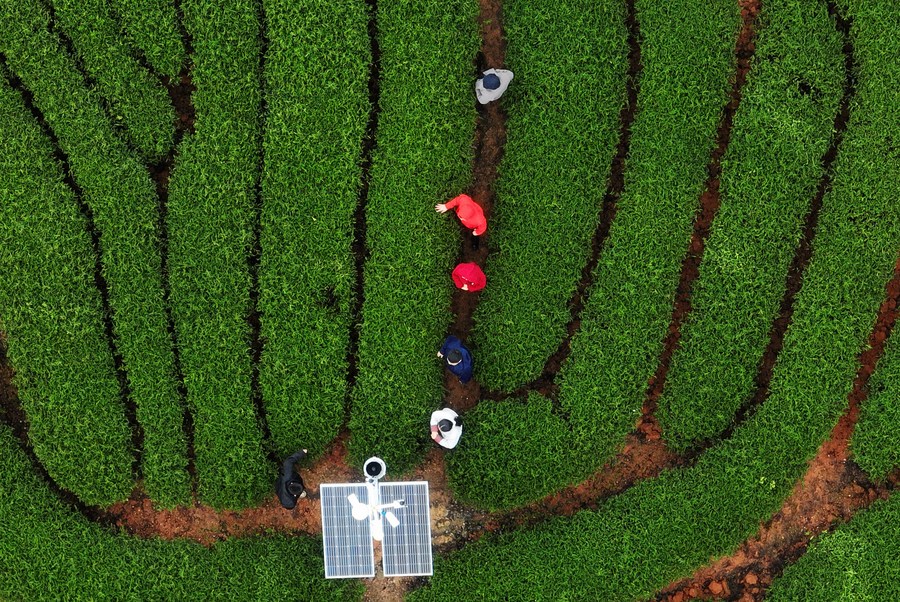SE China's Fujian advances construction of high-standard ecological tea gardens
The tea industry is a specialty industry in southeast China's Fujian Province. In recent years, the province has vigorously advanced construction of ecological tea gardens, promoted innovative growing models, and adopted scientific management practices, achieving long-term development.

This aerial photo taken on Dec. 1, 2022 shows the view of an ecological tea garden in Xingcun township of Wuyishan, southeast China's Fujian Province. [Xinhua/Wei Peiquan]
Statistics show that the ecological tea cultivation areas in Fujian have reached 2.78 million mu (about 185,300 hectares), accounting for about 80 percent of the total tea cultivation areas in the province.
Fujian expects to expand the total area of ecological tea gardens in the province to over 3 million mu by 2025, and promote organic fertilizers in more than 95 percent of the tea gardens, according to the provincial department of agriculture and rural affairs. This way, the province can bring the total tea output value to more than 200 billion yuan (about $29.5 billion) by that time.
In recent years, Fujian's Datian county has been vigorously promoting the development of a tea species called "Meiren tea."
At a tea planting base owned by Fujian Jiangshan Meiren Tea Co., Ltd., grass, soybeans and peanuts are planted together with tea trees as potential green fertilizers. A tiny green cicada, which feeds on tea leaf juice, lives in harmony with the tea trees. After being sucked on by the cicadas, the tea leaves become smaller and yellow. However, after being processed, such tea leaves can have a strong fruit fragrance, making them popular in the market.
Li Zhizhong, president of the company, introduced that as a participant of the formation of the standards for cultivation of the Meiren tea, the company adheres to an eco-friendly tea growing model, applying no chemical pesticides to the tea trees and using only organic fertilizers.
Covering an area of 2,100 mu, the company's tea plantation has helped local tea growers adopt large-scale and standardized tea cultivation.
For over a decade, the tea gardens in Datian county have reached 100,000 mu from 17,000 mu, and the annual comprehensive output value generated by the tea gardens has increased to 3.8 billion yuan from less than 30 million yuan.
Nowadays, more and more standardized ecological tea gardens have been built across Fujian. With shelter forests built around the tea gardens, trees planted along roads inside the tea gardens, and grass planted under or near the tea trees to conserve water and to be used as fertilizers, an ecosystem has been established in the tea gardens.
In the past, local tea growers encountered difficulties in eliminating destructive insects in their tea gardens. According to Gao Feng, an expert of the modern tea technology sector of Fujian Province, the solution lies in restoring the ecological chain consisting of animals and plants inside the tea gardens and surrounding areas.
Nowadays, tea growers in Fujian have adopted the concept of preventing and eliminating destructive insects through biological means.
Fujian has also innovatively reformed the operation of ecological tea gardens. A tea company in Fuding city has joined more than 10,000 local tea growers to help them run their ecological tea gardens, which amounts to 38,000 mu. The company also provides biological pesticides for the growers free-of-charge and a subsidy for each grower to buy organic fertilizers.
Government policies have helped local tea growers in Fujian gain benefits from the tea cultivation business. Fujian Province began promoting the construction of ecological tea gardens in 2008. In 2012, it approved regulations on promoting the development of the tea industry, the first of this kind unveiled by a local government in China, and, in 2019, it implemented guidelines on construction of tea gardens, offering practical guidance to local tea growers.
Zhang Wenjing, an agricultural technician from the planting technology promotion center of Fujian, introduced that the province has carried out three rounds of modern tea cultivation projects for nine consecutive years, including investing more than 800 million yuan of central government funding in the construction of demonstration bases.
There are a total of 71 tea planting areas at the county level in Fujian Province. In 2021, the export of tea leaves in Fujian Province reached $513 million, ranking first in the country for the first time.
























